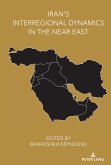The Government and Politics of Lebanon, Second Edition describes the special attributes of Lebanese politics and the functions of its confessional state. It aims to contribute to the reader's understanding of contemporary Lebanese politics, consensus building, and government. It stimulates discussion concerning the nature of consociationalism as a power sharing arrangement for a divided society. The book captures the complexity of Lebanese politics by revealing the challenges embedded in the management of plurality, including institutional paralysis and system stagnations. The second edition features new and expanded chapters that pay particular attention to state's adaptations to post-Arab Spring politics. It expands the analysis on the performance of the Lebanese consociational state in light of turbulent regional environment and the various repercussions associated with regional conflict. It is divided into several parts. The first introduces the particular form and foundations of Lebanese consociationalism and provides an elaborate description of its special features. The second part explains the different rules of the game as institutionalized in the country's international and domestic power sharing arrangements. It describes the international politics of Lebanon and the influence exerted by regional powers in shaping its domestic affairs. It explains the manifestation of domestic parties and electoral systems in the power distribution among the country's different sectarian and ethnic groups. It analyzes the political economy of communitarian politics. The third part focuses on the contemporary powers and functions of the different branches of government as well as their institutional expression of sectarian interests. The fourth part of the book places Lebanese consociationalism in light of contemporary regional turmoil and describes state's responsiveness in mitigating and managing conflicts, particularly those associated with the spillover from the Syrian conflict.
Bitte wählen Sie Ihr Anliegen aus.
Rechnungen
Retourenschein anfordern
Bestellstatus
Storno








